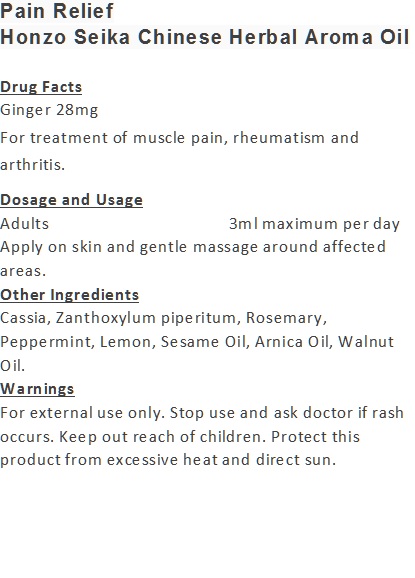Pain Relief Honzo Seika Chinese Herbal Aroma Oil | Pain Relief Oil while Breastfeeding

What is Pain Relief Honzo Seika Chinese Herbal Aroma Oil | Pain Relief Oil used for?
Brief: Use For treatment of muscle pain, rheumatism and arthritis.
Can I continue breastfeeding if I am using Pain Relief Honzo Seika Chinese Herbal Aroma Oil | Pain Relief Oil? How long does it stays in breast milk?

Pain Relief Honzo Seika Chinese Herbal Aroma Oil | Pain Relief Oil Breastfeeding Analsys
Ginger while Breastfeeding
SafeCAS Number: 84696-15-1
The root of this herb is used.It contains oleoresin and essential oil along with sesquiterpene hydrocarbons, and spicy substances (gingeroles and shogaols).Attributed properties: digestive, carminative, antiemetic and anti-inflammatory.Indications according to Commission E of the German Ministry of Health: motion sickness, vomiting (pregnancy, post surgery), anorexia, dyspepsia. Plant widely used in many countries as a condiment and as a medicine. In some cultures its consumption increases during pregnancy or lactation without reported complications (Nordeng 2004, Chen 2013, Kennedy 2013). It is used as a galactogogue by cultures from several continents (Raven 2007, Lamxay 2011, Sim 2103). A study with few participants shown an increase of milk production within the first 6 days postpartum but not later; there was no change on prolactin levels (Paritakul 2016). The best galactogogue result is achieved by a frequent on demand suckling and using a correct technique (ABM Protocol No. 9 2011). It may be considered compatible with breastfeeding (Dennehy 2011)Abuse may be a cause of clotting issues (bleeding) and heartburn.
Pain Relief Honzo Seika Chinese Herbal Aroma Oil | Pain Relief Oil Breastfeeding Analsys - 2
Ginger while Breastfeeding
Ginger (Zingiber officinale) root contains the pungent principles or gingerols that are considered to be responsible for its pharmacological activity. Ginger is commonly used for nausea and motion sickness. It has no specific lactation-related uses in Western medicine, but is reportedly used as a galactogogue in some parts of Asia.[1] A randomized study in Thailand found that milk production was higher on day 3 but not on day 7 with ginger compared to placebo twice daily.[2] In Thailand it is reportedly used as part of a topical herbal mixture to shorten the time to full lactation and also part of a topical herbal mixture used for breast engorgement.[3][4] Galactogogues should never replace evaluation and counseling on modifiable factors that affect milk production.[5] Very limited data exist on the safety and efficacy of ginger in nursing mothers or infants. However, ginger has a long history of use as a food and medicine and is "generally recognized as safe" (GRAS) as a food flavoring by the U.S. Food and Drug Administration, including during lactation.[6] When used as a medicinal, ginger is generally well tolerated in adults, but mild gastrointestinal side effects such as bad taste, heartburn and abdominal discomfort, are reported occasionally. In Thailand it is used as part of a topical herbal mixture to shorten the time to full lactation.[3] Dietary supplements do not require extensive pre-marketing approval from the U.S. Food and Drug Administration. Manufacturers are responsible to ensure the safety, but do not need to the safety and effectiveness of dietary supplements before they are marketed. Dietary supplements may contain multiple ingredients, and differences are often found between labeled and actual ingredients or their amounts. A manufacturer may contract with an independent organization to verify the quality of a product or its ingredients, but that does certify the safety or effectiveness of a product. Because of the above issues, clinical testing results on one product may not be applicable to other products. More detailed information #about dietary supplements# is available elsewhere on the LactMed Web site.
I am nursing mother and I have already used Pain Relief Honzo Seika Chinese Herbal Aroma Oil | Pain Relief Oil, what should I do?
Pain Relief Honzo Seika Chinese Herbal Aroma Oil | Pain Relief Oil is safe in breastfeeding and should not create any health problem for your baby but in case you feel any health issue associated with Pain Relief Honzo Seika Chinese Herbal Aroma Oil | Pain Relief Oil you should contact your doctor or health care provider. Be it pregnancy or lactation you shall keep your doctor informed.
My doctor has prescribed me Pain Relief Honzo Seika Chinese Herbal Aroma Oil | Pain Relief Oil, what should I do?
Definitely, Pain Relief Honzo Seika Chinese Herbal Aroma Oil | Pain Relief Oil is safe in lactation for baby. No wonder your doctor has recommended it.
If I am using Pain Relief Honzo Seika Chinese Herbal Aroma Oil | Pain Relief Oil, will my baby need extra monitoring?
No extra baby monitoring required while mother is using Pain Relief Honzo Seika Chinese Herbal Aroma Oil | Pain Relief Oil
Who can I talk to if I have questions about usage of Pain Relief Honzo Seika Chinese Herbal Aroma Oil | Pain Relief Oil in breastfeeding?
US
National Womens Health and Breastfeeding Helpline: 800-994-9662 (TDD 888-220-5446) 9 a.m. and 6 p.m. ET, Monday through Friday
UK
National Breastfeeding Helpline: 0300-100-0212 9.30am to 9.30pm, daily
Association of Breastfeeding Mothers: 0300-330-5453
La Leche League: 0345-120-2918
The Breastfeeding Network supporter line in Bengali and Sylheti: 0300-456-2421
National Childbirth Trust (NCT): 0300-330-0700
Australia
National Breastfeeding Helpline: 1800-686-268 24 hours a day, 7 days a week
Canada
Telehealth Ontario for breastfeeding: 1-866-797-0000 24 hours a day, 7 days a week
